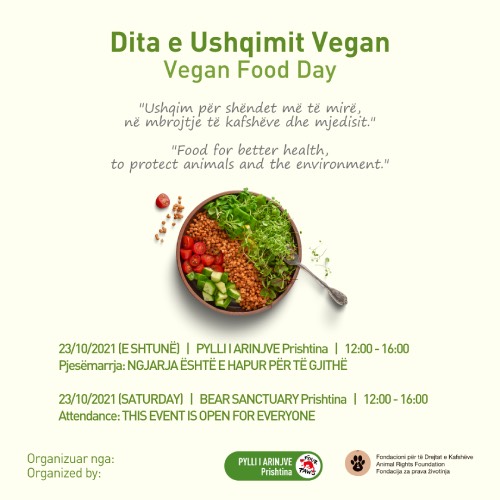
For the first time in Kosovo, a vegan food day is organized that aims to promote the importance of a vegan lifestyle, starting with the food each of us consumes.
This event is co-organized by BEAR Sanctuary Prishtina and the Animal Rights Foundation.
Attendance is open to all who want to taste the vegan food that will be prepared and served in the premises of BEAR Sanctuary Prishtina.
Bear Sanctuary Prishtina, together and with the initiative of the organization “Animal Rights Foundation” are organizing this year the first vegan event, as two organizations for the protection of welfare and animal rights in Kosovo.
Bear Sanctuary Prishtina, a bear rescue center in Kosovo & Albania, is a non-profit organization, supported and under the management of FOUR PAWS. The world-renowned organization FOUR PAWS reacted immediately in 2010, when keeping bears became illegal in Kosovo and is very seriously committed to rescuing all brown bears that were kept indoors or unsuitable for nature and their well-being.
Bear Sanctuary Prishtina is a rescue center for bears who were abused or mistreated by natural and legal persons in Kosovo and Albania, and consists of a space of 16 hectares.
The Animal Rights Foundation (ARF) is a non-profit and non-governmental organization, established in 2018, with the aim of improving animal welfare, focusing on the legislative aspects of protecting and promoting animal rights.
ARF contributes to the legal and policy aspects of improving animal welfare in Kosovo and improving human-animal relations. The organization is committed to all animals, whether they are stray, domestic, farm, experimental, sport or wildlife. All animals deserve a lawful and ethical treatment.
ECOSYSTEM AND FOOD
Animals and the environment play an important role in our ecosystem. The months with the COVID-19 pandemic have shown that we are in a critical situation for our planet and that we must choose to protect and revitalize ecosystems along with wildlife and animals in general, for their sake and for our own health.
According to United Nations (Climate Action) findings, food systems generate one-third of the world’s greenhouse gas emissions. This means that the consumption of animal products is one of the main factors of climate crises that are already happening in the world. Without drastic changes, food system emissions are likely to increase by up to 40% by 2050, given increased population demand, more income and dietary changes.
More than 60% of all global deaths are due to chronic diseases and conditions such as cardiovascular disease, type 2 diabetes, obesity and certain cancers, with a poor diet being considered a major contributing factor to all of these diseases.
Global health authorities agree that the leading cause of deaths worldwide is diet, that even defeats tobacco in this regard.
Despite recent diet trends promoting eating more animal products while avoiding whole grains and many fruits and vegetables, the Global Burden of Disease Study – which involved nearly 500 researchers from more than 300 institutions in 50 countries and examined nearly 100,000 data sources – concluded that the four main foods we need to consume the most to reduce our overall risk of death are fruits, nuts/seeds, vegetables and whole grains.
Findings from the next largest diet and cancer study in human history found that eating just one-quarter of a chicken breast a day increases the risk of some of the fastest-growing cancers, such as lymphomas and leukemias, by up to 280%. And a 2015 Harvard meta-analysis found that men who consumed just five eggs per week increased their risk for a deadly form of prostate cancer by 47%. As stated earlier, research has shown that people who eat a diet rich in animal protein (including red meat, poultry, fish, milk, and eggs) have a more than 400% increased risk of dying from cancer.
WHAT IS VEGANISM?
Veganism is a philosophy and way of life which seeks to exclude – as much as possible – all forms of exploitation and cruelty to animals for food, clothing or any other purpose; and in addition, promotes the development and use of animal-free alternatives for the benefit of animals, humans and the environment. In the dietary aspect, veganism shows the practice of avoiding all products taken in whole or in part from animals.
That means, a vegan does not consume meat, dairy products, eggs, honey, or any animal-derived products. A vegan diet can (and should) be packed with a wide variety of delicious, nutritious foods, including vegetables, whole grains, nuts, legumes, seeds and fruits. Vegans do not wear leather, silk or wool. Many refuse to use products that are made with animal ingredients, products that are filtered using animal parts (such as some wines, beers and white sugars) and products that have been tested on animals.
